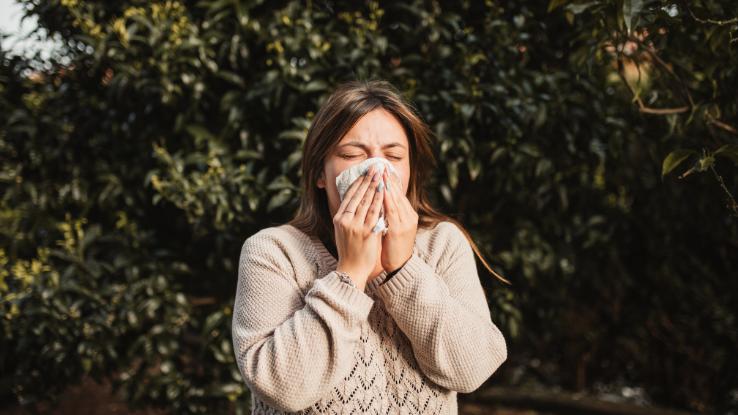How to Make an Air Conditioner Cold Again
Allergies 101: Types, Symptoms, Causes & Treatments

Approximately 50 meg Americans are affected past some class of allergy. Many substances in our surroundings tin can trigger allergy symptoms, some of which are easier to avoid than others. An allergic reaction occurs when the immune system mistakenly identifies a substance (an allergen) equally harmful to the torso. The body's reaction to this "false warning" produces a serial of unpleasant symptoms.
Depending on the type of allergy, symptoms tin occur in the eyes, nose, throat, sinuses, lungs, in the lining of the stomach, or on the peel. Sometimes, the allergic reaction is severe, leading to breathing problems, serious pare rashes, or a life-threatening reaction called anaphylaxis. At other times, allergies symptoms, like itchy optics and a runny olfactory organ, are much more manageable.
In the same way symptoms vary greatly, avoiding allergies or mitigating exposure to triggers can exist tricky. Sometimes, it involves avoiding a detail substance, while, in other cases, patients tin treat allergies using over-the-counter medications; medicines prescribed past a dr.; or allergy shots. All of this to say, it's important to be prepared and sympathize your specific allergies more than thoroughly.
Food Allergies: This type of allergy occurs when the trunk misidentifies certain foods as harmful. Some common food allergens include peanuts, shellfish, soy, wheat, milk, and eggs. Many of these allergens (east.yard. soy, wheat) are "subconscious" in processed foods and can be difficult to identify as the source of the allergic reaction. Food allergies bear upon upwardly to eight pct of children nether the age of three years, and up to three percentage of adults.
Drug Allergies: This type of allergy occurs when the trunk misidentifies certain medications as harmful. Penicillin and antibiotics are the most common causes of drug allergies, only pain relievers; anticonvulsants; insulin; drugs used to treat rheumatoid arthritis; and X-ray contrast dyes can all trigger allergic reactions. Additionally, drug allergies can occur with over-the-counter medications and herbal supplements, not simply medicines prescribed by your doctor.

Seasonal Allergies:
Also known equally hay fever or allergic rhinitis, this type of allergy occurs when the body misidentifies pollen or mold particles equally harmful. Because more than of these particles are released during leap, summertime, and fall, symptoms tend to develop or worsen at these times of the year.
Allergic Dermatitis: This blazon of allergy occurs when the trunk misidentifies certain substances that are applied to or come into contact with the skin. The nearly common allergens are chemicals found in soaps, detergents, and cloth softeners, but allergy-causing substances can likewise be found in pesticides, pilus dyes, nail smooth, shampoos, fragrances in perfumes or moisturizers, topical antibiotics, adhesives, rubber, latex, and metals constitute in jewelry and other objects. Additionally, poison ivy, poison sumac, poisonous substance oak, and other plant sensitivities fall into this category.
Insect Sting Allergy: This blazon of allergy occurs when the body misidentifies the venom from an insect sting equally harmful. While many people have a mild reaction, such as slight redness, swelling, and itchiness from a mosquito bite, others tin can experience more astringent, dangerous reactions. Stings from bees, wasps, hornets and fire ants are common triggers for this allergic response.
Symptoms of Allergies
The types of symptoms a person experiences is often related to the allergen to which they have been exposed. For example, when someone eats a food that they are allergic to, they will unremarkably experience symptoms related to their digestive arrangement, such every bit stomach cramps or diarrhea. Too, allergens that are inhaled typically result in breathing, nose and throat problems, while allergens that touch the skin commonly atomic number 82 to hives, itching or rashes.

Allergies can produce a wide diverseness of symptoms, including:
- Coughing
- Shortness of jiff
- Wheezing
- Chest tightness
- Runny nose
- Congestion
- Itchy nose, throat, mouth, eyes or skin
- Called-for or watery eyes
- Conjunctivitis
- Stomach cramps
- Diarrhea
- Vomiting
- Skin rashes
- Skin swelling
- Urticaria (hives)
For people with more severe allergies — usually those related to foods or insect bites — a severe reaction called anaphylaxis may occur. This condition requires emergency medical care and may cause the post-obit symptoms:
- Skin rash
- Bloated face up and airway
- Noisy breathing
- Severe shortness of breath
- Rapid, weak pulse
- Nausea and vomiting
- Lightheadedness
- Loss of consciousness
Untreated, anaphylaxis can lead to decease.
Causes and Take a chance Factors
Allergic reactions begin in the allowed system, which is designed to protect us from harmful invading organisms, including bacteria and viruses, that have potential to cause illness. Allergies are caused by the immune system mistakenly identifying a substance (an allergen) as a harmful invader.
If you take an allergy, your immune system overreacts when it encounters the allergen by producing immunoglobulin E antibodies, which bind to specialized cells chosen mast cells, which then release a chemic called histamine. In turn, histamine triggers the allergic reaction. Mast cells are present in the eyes, nose, mouth, throat, stomach, and skin — the sites involved in common allergy symptoms.

Some risk factors increase your chances of developing allergies, including:
- Being a kid: Children are more likely than adults to develop allergies. Sometimes children will outgrow an allergy or the allergy volition get away then come back later in life.
- Having asthma: People with asthma are more than likely to develop an allergy.
- Having other allergies: People who have an allergy to something are more likely to develop other allergies.
- Having a family history of asthma or allergies: When a family member has an allergy or asthma, information technology increases an private's gamble for developing an allergic condition. Both genetics (your family history) and your environment likely play a role in your potential allergy development.
Prevention & Treatment
The best way to prevent an allergic reaction is to avoid the allergen. Depending on the allergy, that could mean different things. If you suffer from seasonal or dust allergies, you could utilise a special air filter (e.chiliad. a HEPA filter) to reduce allergens in the air, for example. Additionally, keeping your home free of dust, fume, mold, mildew, and pet dander may help.
If you suffer from insect-sting allergies, wearable low-cal-colored clothing that covers more of your peel when outdoors. If you have a food allergy, information technology might take some fourth dimension to place the specific food that triggers a reaction before you can eliminate it from your nutrition.

Many allergies are effectively treated with medications like corticosteroids, decongestants, antihistamines, leukotriene modifiers, and cromolyn sodium (a mast cell inhibitor). Both over-the-counter and prescription medications are bachelor, and then inquire your physician which medicine might work all-time for you.
In some cases, immunotherapy can be administered via a series of injections (allergy shots). This approach uses small amounts of the allergen to "railroad train" your immune arrangement to recognize it as non harmful. Immunotherapy may be able to reduce the severity of an allergic condition over a number of years. Finally, those with severe allergies often have to carry an emergency epinephrine shot, an "EpiPen" with them. If a astringent allergic reaction occurs, this injection tin can exist used to reduce symptoms until emergency medical intendance arrives.
Although allergies are quite mutual, it's important to seek treatment to reduce your symptoms and avoid potentially dangerous breathing issues. Those with astringent allergies should consider wearing a bracelet or other identifying accessory to alert others of their need for firsthand medical attention if a severe allergic reaction occurs.
Resources Links
- "Allergies" via American Academy of Allergy Asthma & Immunology (AAAAI)
- "Allergic Reactions | Allergy Library" via American Academy of Allergy Asthma & Immunology (AAAAI)
- "Types of Allergies" via Global Allergy & Airways Patient Platform
- "Allergy" via MedlinePlus
- "Drug Allergy" via Mayo Clinic
- "Nutrient Allergy" via Mayo Clinic
- "Allergies — Symptoms & Causes" via Mayo Clinic
- "Allergy-proof Your Home" via Mayo Clinic
- "Allergies — Insects: Bees, Wasps & Hornets" via Centers for Disease Control and Prevention (CDC)
- "Allergy Shots: Could They Assist Your Allergies?" via FamilyDoctor.org
mansfieldhiceivien77.blogspot.com
Source: https://www.symptomfind.com/health-conditions/allergies-condition?utm_content=params%3Ao%3D740013%26ad%3DdirN%26qo%3DserpIndex
0 Response to "How to Make an Air Conditioner Cold Again"
Enviar um comentário